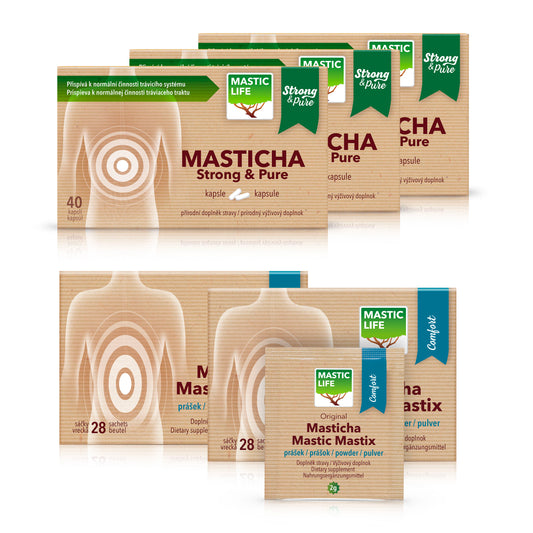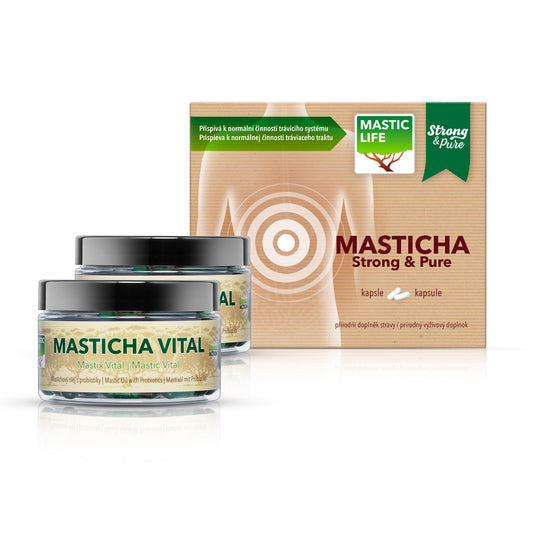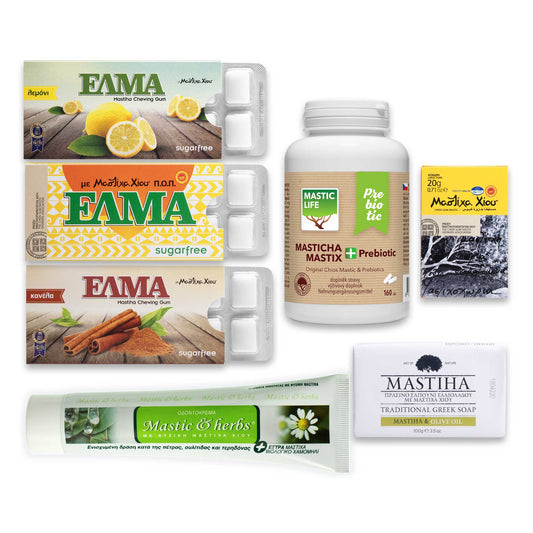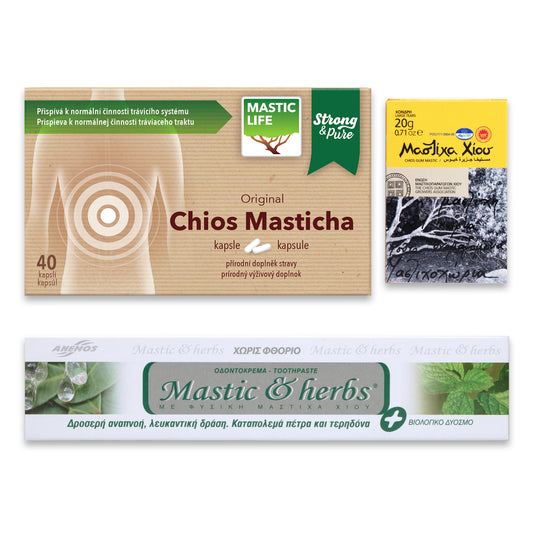Studies: ANTI-ATHEROGENIC ACTIVITY OF CHIOS MASTIC
Interestingly, it has been concluded in various studies that Chios Mastic gum inhibits LDL (Low Density Lipoprotein) oxidation in vitro. In vivo human trials resulted in remarkable decrease in cholesterol, showing its liver and heart protection characteristics. Chios Mastic, in relation with the above, presents a notable antiatherogenic activity, expanding the range of studied phytosterols, and thus comprising a possible novel therapy for atherosclerosis.
Study 1
Loizou et al (2009), investigated the effect of Chios Mastic neutral extract and tirucallol on the expression of adhesion molecules (VCAM-1 and ICAM-1) and the attachment of monocytes (U937 cells) in TNF-a stimulated Human Aortic Endothelial Cells (HAEC). The impact of the treatment with Chios Mastic neutral extract and tirucallol in NFkB phosphorylation was studied as well. Interestingly, both substances inhibit VCAM-1 and ICAM-1 expression in TNF-a-stimulated HAeC in a large extend. Furthermore, the binding of U937 cells to TNF-a stimulated HAEC is also significantly inhibited and the phosphorylation of NFkB p65 is weakened. To sum up, by the present research, existing data regarding the cardioprotective effect of Chios Mastic and the spectrum of known phytosterols with potent antiatheromatic effects are broadened, a novel insight is provided into the mechanisms responsible for the positive effect of Chios Mastic on endothelial function, and it may assist in designing a potential new therapy for intervention in atherosclerosis 37.
Study 2
Vallianou et al (2016) evaluated the effect of camphene oil, a constituent of Mastic, on the de novo synthesis of cholesterol and triglycerides from [14C]-acetate in HepG2 cells, along with the statin mevinolin. Camphene inhibited the biosynthesis of cholesterol in a concentration-dependent manner, and a maximal inhibition of 39% was observed at 100 μM while mevinolin nearly abolished cholesterol biosynthesis. Moreover, treatment with camphene reduced TG by 34% and increased apolipoprotein AI expression. In contrast, mevinolin increased TG by 26% and had a modest effect on apolipoprotein AI expression. To evaluate the mode of action of camphene, its effects on the expression of SREBP-1, which affects TG biosynthesis and SREBP-2, which mostly affects sterol synthesis were examined. Camphene increased the nuclear translocation of the mature form of SReBP-1 while mevinolin was found to increase the amount of the mature form of SReBP-2. The effect of camphene is most likely regulated through SREBP-1 by affecting MTP levels in response to a decrease in the intracellular cholesterol. It was proposed that camphene upregulates SReBP-1 expression and MTP inhibition is likely to be a probable mechanism whereby camphene exerts its hypolipidemic effect.38
Study 3
Vallianou et al (2011) assessed the hypolipidemic properties of the Chios Mastic essential oil, by investigating the hypolipidemic activity of the oil in naïve and in rats susceptible to detergent-caused hyperlipidemia. The consumption of the oil by naïve rats had a dose-dependent decrease in the constitutive synthesis of serum cholesterol and triglycerides. Chios Mastic oil treatment also possessed a strong hypolipidemic action in hyperlipidemic rat. Analysis of the oil’s compounds indicated for the first time that the hypolipidemic effect is linked to camphene. Camphene’s administration at a dose of 30 mg/gr of body weight in hyperlipidemic rats led to a 54.5% decrease of total cholesterol, 54% of LDL-cholesterol and 34.5% of triglycerides. The cellular cholesterol content was reduced, after the human hepatic cell line, HepG2, was treated with camphene, to the same level as mevinolin, which is a known HMG-CoA reductase inhibitor. The HMG-CoA reductase action is independent of the hypolipidemic effect of camphene, indicating that the hypocholesterolemic and hypotriglyceridemic effects are connected to a different mechanism of action than the one of statins. Hence, insight is provided into the use of camphene as an alternative lipid reducing agent 39.
Study 4
Andreadou et al (2016) evaluated the potential anti-ischemic and antiatheromatic activity of Chios Mastic. Total Chios Mastic extract without Polymer (TMeWP) and the neutral Chios Mastic fraction (NMF) were administered orally for 6 weeks to normal fed and to cholesterol fed rabbits. All the animals were randomly divided into 6 groups, anesthetized and subjected to 30min ischemia of the heart, followed by 3h reperfusion: Blood samples were collected at different time points of ischemia and reperfusion, for malondialdehyde (MDA) evaluation as an index of lipid peroxidation, for total and LDL cholesterol determination and for evaluation of oxidized LDL. In the normal fed animals the NMF and the TMEWP reduced significantly the infarct size, while in the hypercholesterolemic rabbits both treatments were ineffective. Atherosclerosis was detected in all animals which were fed cholesterol enriched diet in the form of subintimal accumulation of lipids and foamy macrophages. There was no detection of atherosclerosis in Groups treated with TMEWP and NMF, which both reduced the total cholesterol levels by 47 and 88% respectively, whilst had not effect on LDL oxidation. TMEWP and NMF reduced the MDA concentration in normal fed rabbits, but had no effect on MDA levels in cholesterol fed animals. To conclude, TMeWP and NMPF reduce the infarct size in normal animals and possess significant antiatheromatic and hypolipidemic activities in rabbits fed cholesterol enriched diet 40.
Study 5
Triantafyllou et al (2007), evaluated the effects of Chios Mastic on cardiologic and hepatic biochemical indices of human subjects. Precisely, 133 individuals, over the age of 50, were randomly assigned to two groups. More specifically, the first (high-dose group) consumed 5 g of mastic powder per day, whilst the second group (low-dose group) ingested a Chios Mastic solution per day. The follow up period was 18-month (high- dose group) and a 12-month (low-dose group), and the serum biochemical parameters were determined once per month. The high-dose group demonstrated among others a reduction in serum total cholesterol, LDL and total cholesterol/ HDL ratio. The low-dose group, showed lower glucose levels in males. ergo, Chios Mastic powder could have an in vivo hepatoprotective and/or cardioprotective role in humans 41.
Study 6
Kartalis et al (2015) studied the effects of Chios Mastic on 156 healthy individuals with regards to cholesterol and fasting plasma glucose (FPG) levels, for a total period of eight weeks. The volunteers were divided into 3 groups; the control group ingesting placebo, the total Mastic group receiving 1 g of crude Chios Mastic daily (330 mg capsules, tid), the polymer-free Mastic group taking 1g of polymer free Chios Mastic daily (330mg caps, tid), and the powder Mastic group receiving 2g of crude Chios Mastic per day.
As a result, in the total Mastic group total cholesterol was decreased by 11.5mg/dl and FPG by 4.5mg/dl taking into account the age, gender, BMI and baseline properties. Overweight and obese subjects (BMI>25) showed a stronger effect and the estimated mean decrease of total cholesterol was 13.5mg/dl (p<0.05) and of FPG 5.1mg/dl (p<0.05). Interestingly, there were no side effects in the gastrointestinal, liver or renal system. Hence, Chios Mastic presents an essential reducing activity on total cholesterol and glucose levels of healthy individuals, with exceptional tolerance and no detectable adverse events 42.
Furthermore, Mastic was investigated in terms of its effect in early markers of oxidation and atheromatosis in an IBD cohort consisting of both Crohn’s disease and Ulcerative colitis patients in relapse. Oxidative activity in IBD patients is high and an increased risk for cardiovascular events, such as myocardial infarction and heart failure, has been reported. OxLDL, oxLDL/HDL and oxLDL/LDL decreased significantly in patients administered with Mastic, indicating the antioxidant/athiatherogenic and cardioprotective effect of this natural supplement 43
- Loizou S., Paraschos S., Mitakou S., Chrousos G.P., Lekakis I., Moutsatsou P. [2009]: Chios mastic gum extract and isolated phytosterol tirucallol exhibit anti-inflammatory activity in human aortic endothelial cells. Exp Biol Med., 234: 553–561.
- Vallianou I, Hadzopoulou-Cladaras M. [2016]: Campherne, a plant derived monoterpene exerts its hypolipemic effect by affecting SREBP-1 and MTP expression. PloS One Jan 19;11(1):e0147117. doi: 10.1371/ journal.pone.0147117. eCollection 2016.
- Vallianou I., Peroulis N., Pantazis P., Hadzopoulou-Cladaras M. [2011]: Camphene, a plant-derived monoterpene, reduces plasma cholesterol and triglycerides in hyperlipidemic rats independently of HMG-CoA reductase activity. PLoS One., 6 (11): e20516.
- Andreadou I, Mitakou S, Paraschos S, Efentakis P, Magiatis P, Kaklamanis L, Halabalaki M, Skaltsounis L, Iliodromitis EK. [2016]: Pistacia lentiscus L.” reduces the infarct size in normal fed anesthetized rabbits and possess antiatheromatic and hypolipidemic activity in cholesterol fed rabbits. Phytomedicine. 15;23(11):1220- 6. doi: 10.1016/j.phymed.2016.06.002.
- Triantafyllou A., Chaviaras N, Sergentanis T.N., Protopapa E., Tsaknis J. [2007]: Chios mastic gum modulates serum biochemical parameters in a human population. J Ethnopharmacol., 111 (1): 43-49.
- Kartalis A., Didagelos M., Georgiadis I., Benetos G., Smyrnioudis N., Marmaras H., Voutas P., Zotika C, Garoufalis S., Andrikopoulos G. [2015]: Effects of Chios mastic gum on cholesterol and glucose levels of healthy volunteers: A prospective, randomized, placebo-controlled, pilot study (Chios-Mastic). eur J of Prev Cardiol, epub ahead of print.
- Papada E, Forbes A, Amerikanou C, Torović L, Kalogeropoulos N, Tzavara C, Triantafillidis JK, Kaliora AC. Antioxidative Efficacy of a Pistacia Lentiscus Supplement and Its Effect on the Plasma Amino Acid Profile in Inflammatory Bowel Disease: A Randomised, Double-Blind, Placebo-Controlled Trial. Nutrients. 2018 Nov 16;10(11). pii: E1779. doi: 10.3390/nu10111779
Chios Mastic – Cardioprotective & Hypolipidemic Summary
Chios Mastic gum inhibits LDL oxidation in vitro and reduces cholesterol in vivo, showing hepatoprotective and cardioprotective effects. It demonstrates antiatherogenic activity and may offer a novel therapy for atherosclerosis.
- Study 1 (Loizou, 2009): Mastic extract and tirucallol inhibited VCAM-1 and ICAM-1 expression, reduced monocyte adhesion, and weakened NFkB phosphorylation in human aortic endothelial cells, supporting cardioprotective effects.
- Study 2 (Vallianou, 2016): Camphene from Mastic inhibited cholesterol and triglyceride synthesis in HepG2 cells, modulating SREBP-1 and MTP expression, showing hypolipidemic potential.
- Study 3 (Vallianou, 2011): Mastic essential oil reduced serum cholesterol, LDL, and triglycerides in hyperlipidemic rats, independently of HMG-CoA reductase activity; camphene identified as active component.
- Study 4 (Andreadou, 2016): Mastic extract reduced infarct size in normal rabbits and showed antiatheromatic and hypolipidemic activity in cholesterol-fed rabbits.
- Study 5 (Triantafyllou, 2007): In humans, high-dose Mastic powder lowered total cholesterol, LDL, and total cholesterol/HDL ratio; low-dose improved glucose levels in males.
- Study 6 (Kartalis, 2015): In healthy volunteers, Mastic reduced total cholesterol and fasting plasma glucose, with stronger effects in overweight/obese subjects, and no adverse effects reported.
- Additional findings: Mastic decreased oxidative markers (oxLDL, oxLDL/HDL, oxLDL/LDL) in IBD patients, indicating antioxidant and cardioprotective effects.
Conclusion: Chios Mastic supports heart and liver health through antioxidant, antiatherogenic, and hypolipidemic mechanisms, with strong tolerance and no detectable side effects.
Mastic for your gastrointestinal tract
-
 8-week treatment 🗓️
8-week treatment 🗓️Mastic 8 weeks
Regular price €78.00 EURRegular price€97.50 EURSale price €78.00 EURSale -
 60-day treatment 💪
60-day treatment 💪Mastic Gum Extra for 60 days
Regular price €139.00 EURRegular price€174.70 EURSale price €139.00 EURSale -
 Gift set 🎁
Gift set 🎁Mastic „Life with Mastic"
Regular price €58.00 EURRegular price€63.53 EURSale price €58.00 EURSale -
 Gift set 🌿
Gift set 🌿Mastic „Pure Mastic“
Regular price €29.90 EURRegular price€32.70 EURSale price €29.90 EURSale





